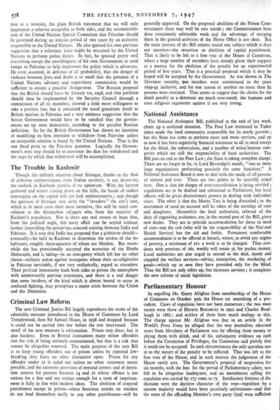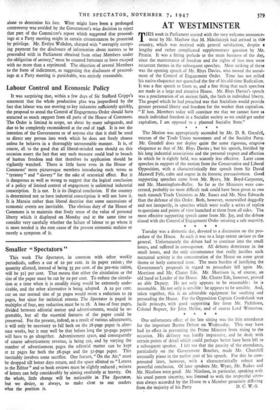Parliamentary Honour
In expelling Mr. Garry Allighan from membership of the House of Commons on October 3oth the House set something of a pre- cedent. Cases of expulsion have not been numerous ; the two most recent were those of Horatio Bottom:ey in 1922 and Charles Brad- laugh in 1882 ; and neither of them bore much analogy to this. The charge against Mr. Allighan was that in an article in the World's Press News he alleged that the way journalists obtained news from Members of Parliament was by offering them money or plying them with drink, and of his subsequent 'evidence on oath before the Committee of Privileges, the Committee said plainly that it could not be accepted. In such circumstances the only question was as to the nature of the penalty to be inflicted. That was left to the free vote of the House, and in such matters the judgement of the House rarely errs. The Government's proposal of suspension for six months, with the loss for the period of Parliamentary salary, was felt to be altogether inadequate, and an amendment calling for expulsion was carried by 175 votes to 75. Satisfactory features of the decision were the decisive character of the vote—expulsion by a narrow majority would have been peculiarly unfortunate—and that the votes of the offending Member's own party (102) were sufficient
alone to determine his fate. What might have been a prolonged controversy was. avoided by the Government's wise decision to reject that part of the Committee's report which suggested that proceed- ings at a Party meeting might in certain circumstances be protected by privilege. Mr. Evelyn Walltden, charged with "corruptly accept- ing payment for the disclosure of information about matters to be proceeded with in Parliament obtained from other Members under the obligation of secrecy," must be counted fortunate to have escaped with no more than a reprimand. The objection of several Members to the form of indictment, as suggesting that disclosure of proceed- ings at a Party meeting is punishable, was entirely reasonable.



































 Previous page
Previous page